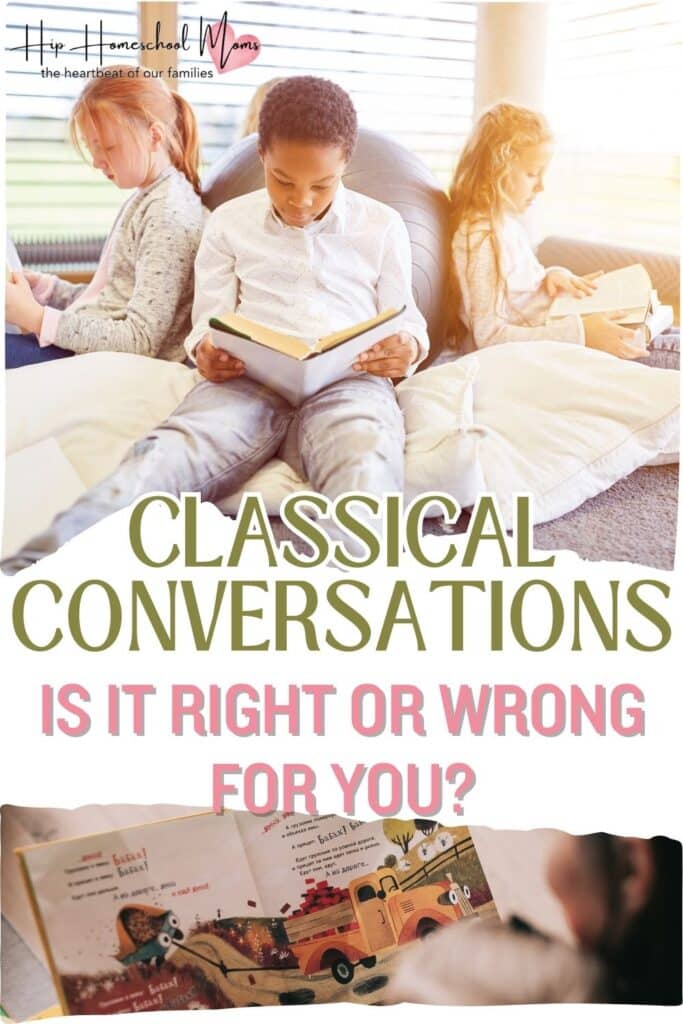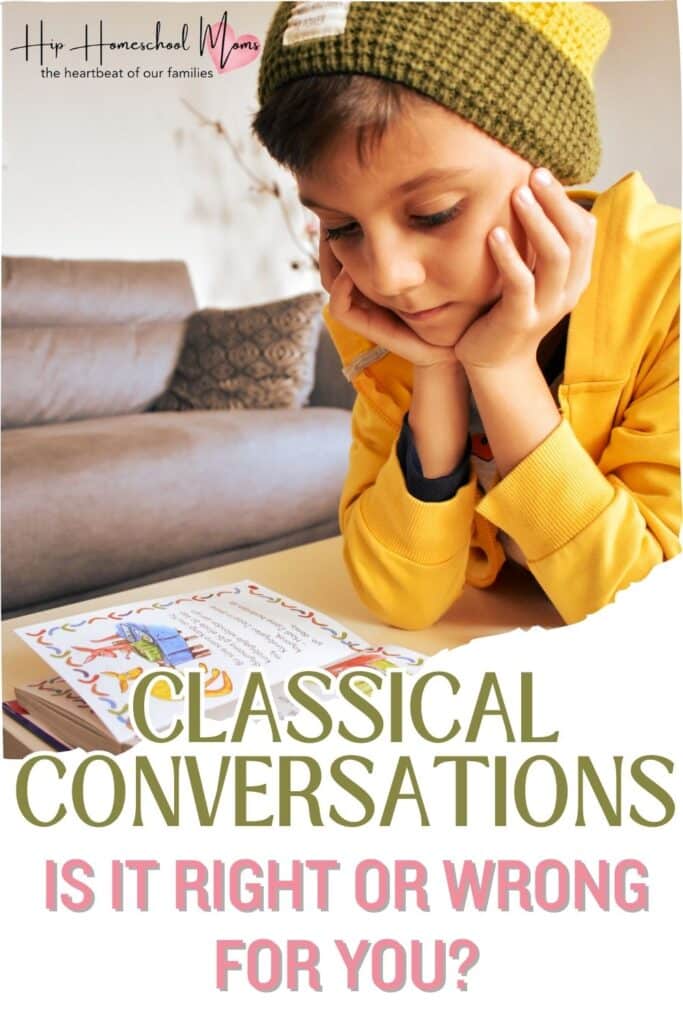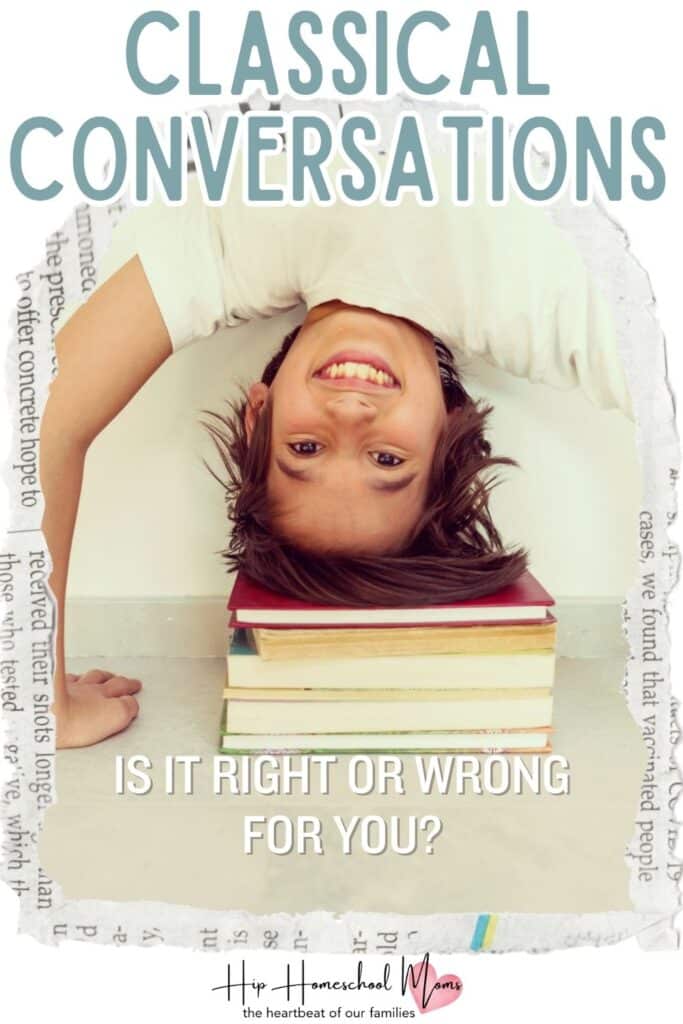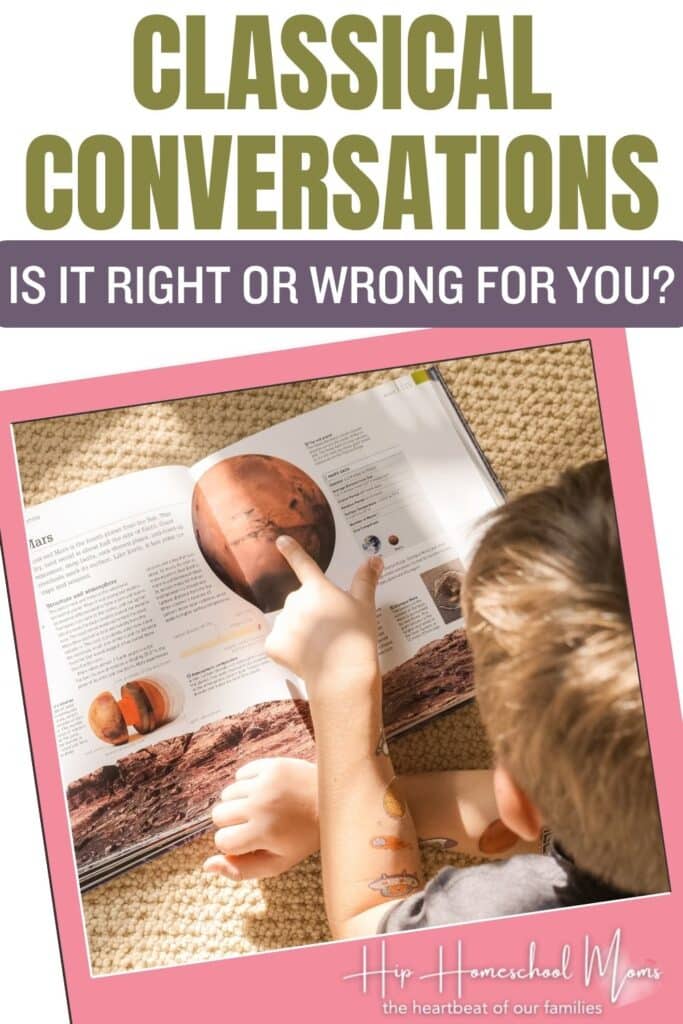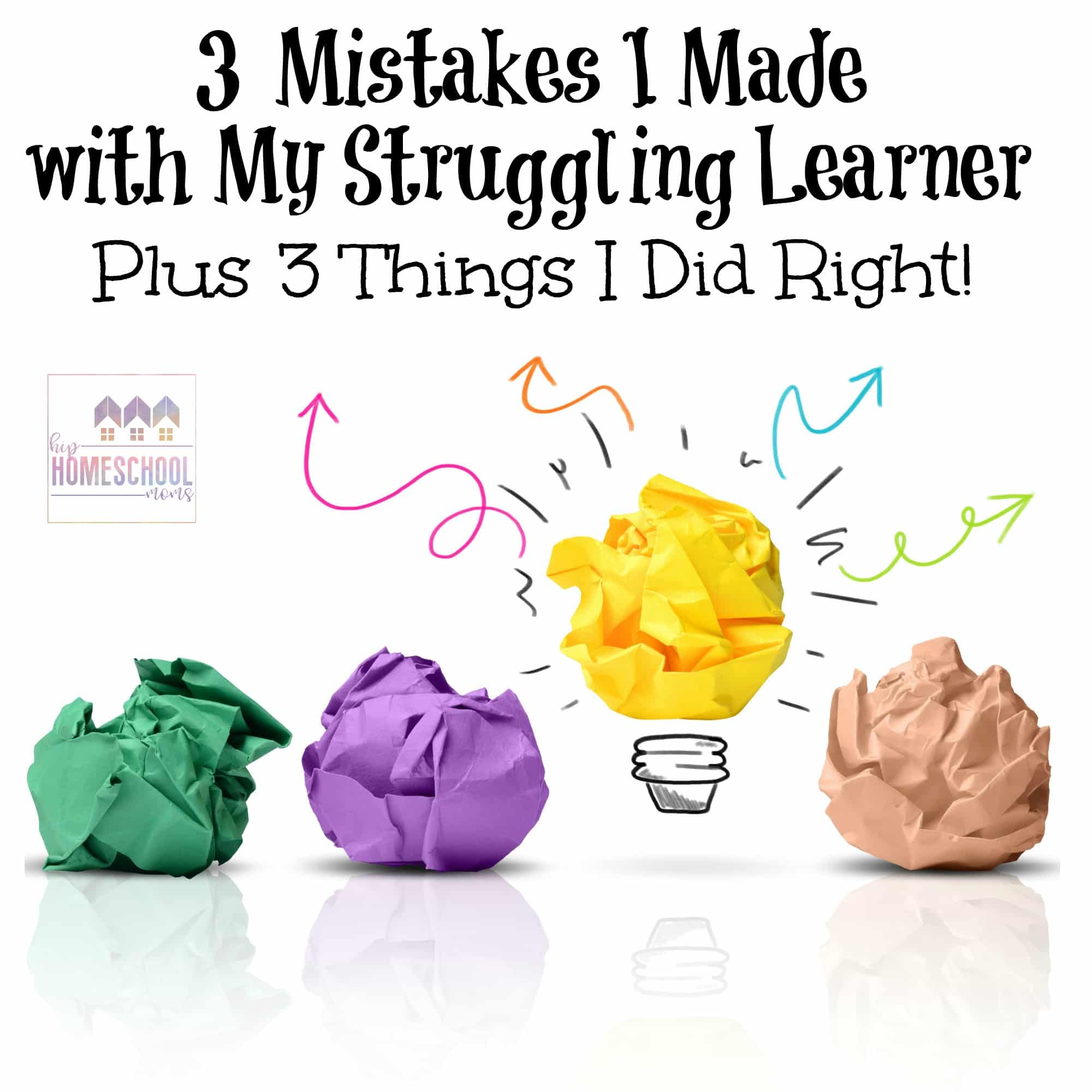Is Classical Conversations Right or Wrong For Your Family?
I’d be surprised if you haven’t heard of Classical Conversations (or CC, as it’s commonly called). The method-based homeschooling program was started by Leigh Bortins in the late 1990s. Since its origins as a classical Christian educational program, it has also grown rapidly as a business model. You can find local chapters, known as “CC communities,” all over the nation and in other parts of the world, too. It is vastly appealing to many, and communities grow each year.
If you are looking for more information about the basic concept behind Classical Conversations, check out these books written by the founder, Leigh Bortins.
[The actual author of this article has requested anonymity; Trish did not write it.]

A couple of years ago, I found myself making friends with some homeschool moms in my area. As a homeschooling mom of an only child, I was excited to connect with other homeschooling families and be on my way to finding what I hoped would be the long-anticipated “homeschool community” many of us have (and many of us only dream of having). It didn’t take long for me to realize these families were already a part of a larger, and booming, homeschooling community in our area: the local chapter of Classical Conversations.
Of course, my homeschooling friends really wanted me to check out Classical Conversations. They loved it, and they were sure I would love it too, and that it would be good for my small family to be involved in a homeschool community.

Skeptical of Classical Conversations
Now, here is the part where I’ll tell you that I tend to be a little rebellious; I am also more than a little skeptical when it comes to complete enthusiasm for “ideal communities.”
For starters, I felt content with my current homeschool approach. One reason that I (and many people) are drawn to homeschooling is the ability to be flexible and do our own thing. I didn’t want to give any of that up.
Second, while I appreciate many things about classical education (having had one myself), I have never believed that it is the only way to go. I am somewhat eclectic in my educational style.
Third, my background in psychology makes me sensitive to community dynamics. I tend to be wary when I hear people excessively praising “ideal communities.” It triggers the Jim Jones fear in my bones. Adding to this concern, some online digging into Classical Conversations revealed extremely conflicting opinions. Some people were worried about Classical Conversations being a pyramid scheme or a bit cultish. Numerous others thought CC was the most amazing thing that had ever happened to their homeschool!
Deciding to make my own decision, I agreed to come to a Classical Conversations preview day and consider it. I felt good about this mainly because I was already close to so many people who were involved and had a lot of respect for the woman who was the director of our local chapter. I was also excited by the idea of more friendships with other homeschoolers, and more Biblical presence and influence in my child’s life. Ultimately, these strong positives were what won us over, leading us to join our local CC community.
I was also excited by the idea of more friendships with other homeschoolers, and more Biblical presence and influence in my child’s life.
Is Classical Conversations Right or Wrong for Your Family?
Even though I do truly enjoy Classical Conversations, and our community, I would be the first to say that CC is not the best homeschool option for everyone. The program has some definite pros but it has cons too. Truly, I couldn’t say that CC would be ideal even for us with a different community or in a different season of life.
My point in writing this honest review of Classical Conversation is not to win anyone over to it … or dissuade anyone from it. Instead, I hope to offer you an honest look into our experience of the CC program (specifically Foundations) and what I’ve observed. Here are some of the top things you should consider if you’re trying to decide if CC is right for you (or not!).
Classical Conversations Might Be for You If:
You long to be part of an active homeschool community.
If you’re looking for a consistent way to really connect with fellow homeschoolers, CC’s weekly gatherings could be a great way for you to “find your people.” Because parents are required to be on campus during community days, this lends itself towards connecting with entire families, in addition to kids connecting with their peers. In our experience, this has probably been the best thing about CC.
We felt a lack of community in our homeschool before CC, especially as a smaller family. This year, I was given the opportunity to be a CC tutor and lead a class on community days. It’s been a challenging (yet also fun and rewarding) way to get more involved, and it helps offset the cost as well. Sometimes we need an opportunity to give back (this is especially true for introverts like me!). Serving can be a true challenge to invest in other people, which is part of what community is about.
While I know some places have great co-op options, our Classical Conversations experience has been more consistent – and more meaningful – than any other co-op option we could have found locally.
You’re new to homeschooling and/or desire more built-in structure.
A lot of people who are new to homeschooling struggle with insecurity about what they’re doing, and sometimes you need to shake up your structure even if you do feel like you know what you’re doing!
Classical Conversation’s curriculum is extremely structured, consistent across all the groups, and pretty rigorous (especially for older ages). It doesn’t cover every subject, but if you’re looking for more structure, direction, and accountability in your homeschool, CC might be a good fit for you. Beyond the materials and Foundation guide used in the community, there are also a lot of great supplemental worksheets and resources available for members on the Website.
Honestly, I wasn’t looking for more structure with CC initially. I was almost solely there for the community aspect. However, I have found that it is nice to have built-in plans for things my daughter can learn or work on when life gets messy (as it does sometimes.) There are plenty of memorization songs and other easy-to-practice memory work that can fit into our day when running errands, walking, or cooking together.
I found that the CC Foundations curriculum is a good supplement to our homeschool that can be implemented as much as I want to. For us, the CC curriculum has offered some nice consistency to our homeschool schedule. Some people use the curriculum almost exclusively, but that is not my thing.
I have discovered, essentially, that being a part of CC doesn’t mean it has to be our entire homeschool life (which is what I was afraid of initially). However, the structure is there for you to use when you want it, and that can be truly helpful sometimes.
You Value a Biblical Worldview.
If you are a Christian, and that’s an important part of homeschooling for your family, then Classical Conversations can fit right into that framework. I can’t speak for all communities, of course, but ours has been a really “practice-what-you-preach,” Biblically-sound, grace-filled community. We’ve been well-loved there, and I value the opportunity to pray and connect with other Christians regularly.
Disclaimer/caveat: Just because a group says it’s “Biblically based,” I wouldn’t assume they always are. I grew up being part of another classically-based, Christian organization, and it did not actively model grace or love. I know several peers who struggled with their faith years later, as a result. This is one reason I would highly recommend visiting and becoming very familiar with your local community before joining. In my experience, these situations can play a very big positive or negative role in a child’s faith.
You love the classical method but don’t want to send your kids to private school.
If you love the classical method of education, then CC will probably excite you! Students today don’t typically get exposure to this method of education in a group setting, outside of high-end private schools. This makes CC an appealing alternative to homeschooling parents who are looking for a way to classically educate their kids.
Basically, this method revolves around “the Trivium,” a three-stage process that advances as learners grow. The first part of the process is the Grammar stage, which focuses on memorization and foundational knowledge. Next comes the Logic stage, which encourages more critical thinking on that foundational knowledge. Lastly is the Rhetoric stage, where students apply all that they learned in the previous stages and master effective expression and persuasion.
A noteworthy aspect of this approach is that each stage builds upon the previous one. In other words, it would be really hard to jump in at “Rhetoric.” However, it is impressive to witness students who have been through the whole process.
The classical method is very different from how most students learn today, and yet it has been a well-respected educational method since ancient times. While I’m not 100% in agreement that “Classical is always best,” I can’t help but be impressed (first-hand) at how much valuable information kids can learn in the “Grammar stage.”
Classical Conversations Might Be Wrong for You If:
Okay, you’ve seen the reasons CC might be a good option for you, but here are a few reasons why it might not. Some of these have to do with practicalities, and others have more to do with the organization as a whole.
You can’t be actively involved on Classical Conversations days.
Classical Conversations days are not “drop your kids off” events. A CC community day is an all-in type of commitment. On community days, at least one parent has to be there to represent each family, and this can be tough for working parents who homeschool, or for parents with babies, toddlers, or special needs kids in tow. It’s not always easy, or even possible, for some families.
Furthermore, CC classrooms get crowded and often chaotic because that’s what happens when you have whole families in a community-learning situation. It can be stressful. It may even be too loud or messy for some children or families to enjoy or benefit from.
If your work schedule, family personalities, or season of life don’t allow for at least one parent to be “all in” for one CC day each week, then Classical Conversations simply might not be a good fit.
You strongly dislike being told what to think (or say).
I told you earlier; I’m a little rebellious. I don’t like to be told that “Classical is the best way,” or that “Classical Conversations will help me ‘redeem’ my own education as an adult,” or that “the goal of the Classical Conversations tutor is to teach the parent how to homeschool.” These are phrases you will absolutely hear when joining a community or reading the materials.
These types of statements are big turn-offs for me because I perceive them as a little manipulative–possibly potentially designed to target new or insecure homeschool parents.
In a similar vein, there are also many special Classical Conversations expressions, vocabulary, and phrases that we are encouraged to use. I know that these are part of the learning culture, but they also seem designed to make CC seem unnecessarily formal and intensely academic. I feel this falls into this same category of intimidating the less-experienced homeschool parent, too. While I can’t say that that is the intent for sure, it is still a bit off-putting to me.
Frankly, even though I love our community, I won’t be using these phrases or telling anyone that CC is the only way to go. I am confident you can give your homeschooled child an awesome education with, or without, Classical Conversations. There are many great ways to homeschool!
Budget is a big consideration.
Even though Classical Conversations isn’t nearly as expensive as sending your kids to private school (for what is, in some ways, a similar type of education), it’s not cheap. Costs differ depending on your local community, but it can definitely add up if you have multiple kids.
As I mentioned, tutoring is one way to offset this cost, though it is a large time and energy investment, and only a few tutors are needed in each community. The cost of Classical Conversations also goes up as students enter different levels. For example, my daughter is in the Foundations program (the Grammar stage) and that’s the least expensive level. If we stick with CC, I can expect costs to rise in the future. If we want to afford this, I may need to tutor more than one level of CC. Tutoring requires a lot of prep time, which isn’t an option for everyone. Meanwhile, paying the tuition outright also isn’t doable for everyone.
If you’re invested in the Classical method, you’ll theoretically want to go the whole way through, since that’s how you see educational payoff with this method. Over time, that could be a lot of money. It is worth checking into your local community’s cost to see how much this is in your area, and evaluating if it’s something you can afford.
You are getting weird vibes about the general business practices and/or culture of your local group.
I have experienced no issues with the business practices or culture of my local Classical Conversations community. However, the fact remains that Classical Conversations is a for-profit business that operates in an umbrella-esque kind of way, ultimately feeding money back to the corporation. A quick Google search reveals that this business model absolutely can create problems in some groups. Honestly, I came across plenty of concerns and complaints about it in my online digging.
From my personal experience as a tutor, I can say that we put in a lot of time for very little money. And, objectively, that’s a little questionable from a business standpoint, especially given how much money we all pay for our kids to be there. My understanding is that most of it does go back to the company. If you’re on the outside looking in, the disputes people have about the business side of things may be something to consider.
Personally, I think very few people (directors, tutors, parents) go into Classical Conversations at any level thinking, “I’m going to get rich!” That’s not why we’re there. We’re there to buy the product that Classical Conversations is selling, which is: community, classical education, consistency of curriculum, and Christian atmosphere.
However, with so many different communities operating in so many different ways, there are bound to be some less-than-great communities, maybe even some that are predatory. While I truly believe it’s a case-by-case issue, it’s an issue worth being aware of.
You’re not into classical methods at all.
If classical education doesn’t resonate with you, at least a little bit, then CC might not be for you. One thing that bothered me about CC initially was the amount of time young kids spent memorizing facts they did not understand at all. I couldn’t resist the urge to go a little bit deeper, even though this is not an emphasized part of Foundations. That’s because, as kids grow up in the program, the classical approach becomes a more important part of what they’ll be doing every day at home. If you know you’re not a fan of Classical education methods, it might not be worth getting personally invested.
I have come to appreciate the emphasis on memorization, however, as an element of our homeschool. This is because I’ve seen payoff at home with subjects like history and geography. However, if you don’t adore the Classical Method (or at least appreciate it, as I do), then I would say it might not be worth getting started with CC.
Closing Thoughts
I’ll end with this… Classical Conversations can be an awesome addition to your homeschool if you are looking for community involvement, a classical approach, and a Christian worldview. However, it may not be for you if you’re unable to commit to CC days or the financial aspects, if you have bigger issues with the company, or if the classical method (or Christian worldview) is not a high priority in your homeschool.If you have decided against the Classical Conversations style of homeschooling, know there are many ways to homeschool. Having an only child sometimes feels harder, but we have some advice for you moms of onlies. Here is an article written by a mom of an only child, to give you some ideas of how you can homeschool an only child. And if you are struggling to find the right curriculum to fit your homeschool, here is an article on our sister site that should help!
Ultimately, my main advice in determining if Classical Conversations is right for you is this: if the pros appeal to you, find out more about your local group from those who are in it. Ultimately, it’s the leadership and the fellowship of each group that creates the experience. Just because I love my CC community, that doesn’t mean you’ll love yours!
What do you think? If you have been involved in Classical Conversations or have considered getting involved, what are some reasons you find it appealing? What are some fears you have? We’ll do our best to get back to you in the comments!


